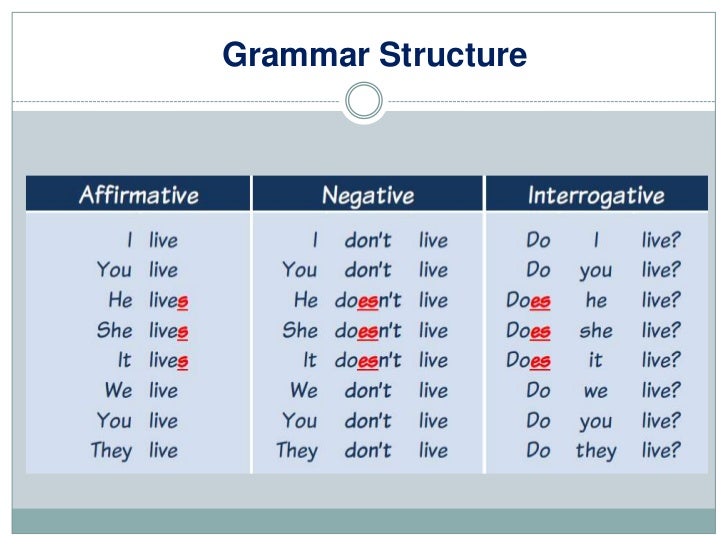The seven basic pronouns have one form when they are used as subjects and another form when they are used as objects.
Subjects are what the sentence is about.
Objects are what is affected by the action of the subject.
- I like whisky. (I is the subject).
- I read books. (Books is the object as it is receiving the action).
| PRONOUNS |
|---|
| Subject Pronoun | Object Pronoun |
|---|
| I | Me |
| You | You |
| He | Him |
| She | Her |
| It | It |
| We | Us |
| You (plural) | You |
| They | Them |
Object pronouns are used instead of nouns, usually because we already know what the object is. It makes the sentence easier to read and understand and avoids repetition. We normally use object pronouns after a verb or a preposition.
| Examples |
|---|
| I like horses. | Subject Pronoun |
| Horses don't like me. | Object Pronoun |
| |
| We talk to our neighbour. | Subject Pronoun |
| She talks to us. | Object Pronoun |
| |
| They listen to the teacher. | Subject Pronoun |
| Listen to me carefully. | Object Pronoun |
| |
| You speak very quickly. | Subject Pronoun |
| We watch them on TV. | Object Pronoun |
The Object Pronoun - it
Be careful when using 'it' as an object pronoun because it is only in the correct context that it has meaning. It needs to have already been mentioned or obvious to the listener what you are referring to. Compare;
- You are sitting on it! (The listener probably doesn't know what the speaker refers to).
- The letter is on the sofa. You are sitting on it! (It is obvious in the second sentence that the reference is to the letter)
Indefinite Pronouns
The indefinite pronouns are:
| somebody | someone | something |
|---|
| anybody | anyone | anything |
| nobody | no one | nothing |
| everybody | everyone | everything |
We use indefinite pronouns to refer to people or things without saying exactly who or what they are. We use pronouns ending in -body or -one for people, and pronouns ending in -thing for things:
Everybody enjoyed the concert.
I opened the door but there was no one at home.
It was a very clear day. We could see everything.
We use a singular verb after an indefinite pronoun:
Everybody loves Sally.
Everything was ready for the party.
When we refer back to an indefinite pronoun we normally use a plural pronoun:
Everybody enjoyed the concert. They stood up and clapped.
I will tell somebody that dinner is ready. They have been waiting a long time.
We can add -'s to an indefinite pronoun to make a possessive.
They were staying in somebody’s house.
Is this anybody’s coat?
We use indefinite pronouns with no- as the subject in negative clauses (not pronouns with any.)
Anybody didn’t come >> Nobody came.
We do not use another negative in a clause with nobody, no one or nothing:
Nobody came.
Nothing happened.
We use else after indefinite pronouns to refer to people or things in addition to the ones we already mentioned.
All the family came, but no one else.
If Michael can’t come we’ll ask somebody else.
So that's eggs, peas and chips. Do you want anything else?
Can
Can is an auxiliary verb, a modal auxiliary verb. We use can to:
- talk about possibility and ability
- make requests
- ask for or give permission
Structure of Can
subject + can + main verb
The main verb is always the bare infinitive (infinitive without "to").
| subject | auxiliary verb | main verb | |
| + | I | can | play | tennis. |
| - | He | cannot | play | tennis. |
| can't |
| ? | Can | you | play | tennis? |
Notice that:
- Can is invariable. There is only one form of can.
- The main verb is always the bare infinitive.
The main verb is always the bare infinitive (infinitive without "to"). We cannot say: 
Use of Can
Can: Possibility and Ability
We use can to talk about what is possible, what we are able or free to do:
- She can drive a car.
- John can speak Spanish.
- I cannot hear you. (I can't hear you.)
- Can you hear me?
Normally, we use can for the present. But it is possible to use can when we make present decisions about future ability.
- Can you help me with my homework? (present)
- Sorry. I'm busy today. But I can help you tomorrow. (future)
Can: Requests and Orders
We often use can in a question to ask somebody to do something. This is not a real question - we do not really want to know if the person is able to do something, we want them to do it! The use of can in this way is informal (mainly between friends and family):
- Can you make a cup of coffee, please.
- Can you put the TV on.
- Can you come here a minute.
- Can you be quiet!
Can: Permission
We sometimes use can to ask or give permission for something:
- Can I smoke in this room?
- You can't smoke here, but you can smoke in the garden.
(Note that we also use could, may, might for permission. The use of canfor permission is informal.)
